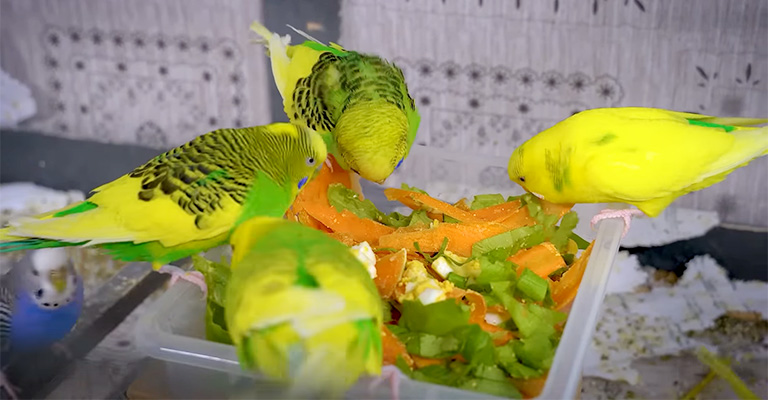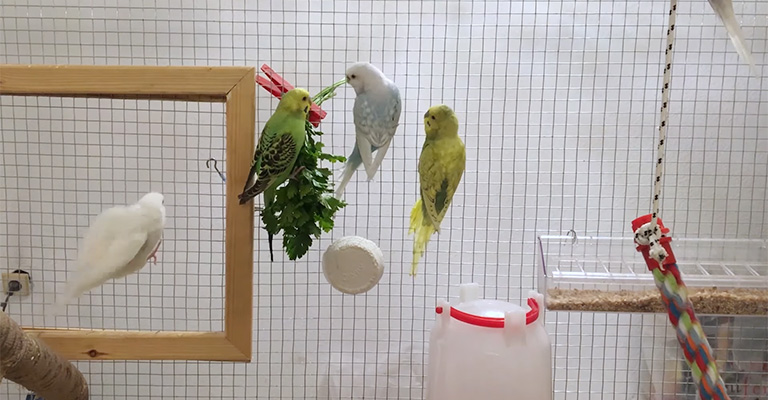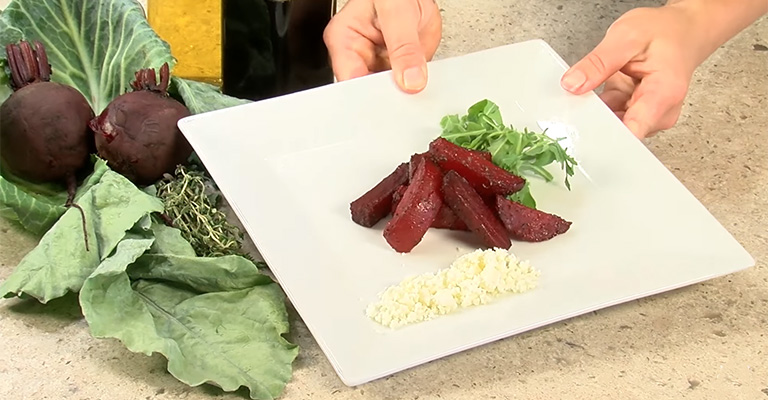In the captivating world of avian companionship, the pursuit of a balanced and enriching diet is paramount to the well-being of our feathered friends.
Amidst this quest, the question arises: Can budgies eat beetroot leaves? These vibrant parrots, known for their curious nature, require a diverse array of nutrients to thrive.
Exploring the potential benefits of incorporating beetroot leaves into their dietary repertoire unveils a tapestry of health advantages.
From essential vitamins and minerals to digestive support and mental enrichment, the inclusion of these leaves adds a new dimension to the dietary considerations for budgies.
This exploration delves into the potential advantages of introducing beetroot leaves to their meals while emphasizing the importance of moderation and mindful nutrition.

Can Budgies Eat Beetroot Leaves?
While budgerigars, or budgies, have specific dietary requirements, incorporating a variety of fresh vegetables can offer them essential nutrients and enrichment.
However, when it comes to beetroot leaves, there are considerations to keep in mind.
Here are some common reasons to be cautious when offering beetroot leaves to your budgies:
Oxalates Content
Beetroot leaves contain oxalates, which in high amounts can interfere with calcium absorption and potentially lead to health issues like kidney stones in budgies.
Calcium-Phosphorus Balance
High oxalate levels in beetroot leaves can upset the calcium-phosphorus balance in budgies’ diets, affecting bone health and overall well-being.
Starchy Nature
Beetroot leaves are relatively starchy, and excessive consumption might lead to weight gain and digestive problems in budgies.
Moderation Required
Due to their potential drawbacks, if you choose to offer beetroot leaves, it’s important to do so in moderation to avoid overwhelming their diet with this particular food.
Varied Diet Focus
Instead of relying heavily on beetroot leaves, prioritize a varied diet that includes a range of safe and nutrient-rich vegetables to provide a balanced nutritional profile for your budgies.
Sensitive Digestion
Budgies have sensitive digestive systems, and sudden or large amounts of unfamiliar foods like beetroot leaves can cause digestive upset.
Low Nutritional Priority
While beetroot leaves offer some nutrients, there are other vegetables with higher nutritional value that can be safer and more beneficial additions to your budgies’ diet.
Preparation Consideration
Thoroughly wash and prepare beetroot leaves to remove any potential pesticide residues before offering them to your budgies.
Consulting Avian Experts
Before introducing beetroot leaves or any new food, consult with an avian veterinarian or avian nutritionist to ensure it’s safe and appropriate for your budgies’ individual needs.
Incorporating a balanced and safe diet that focuses on budgies’ nutritional requirements while avoiding potential pitfalls is essential for their health and well-being.
Always prioritize well-researched and proven options to ensure that your beloved budgies receive the best care possible.
Which Parts of Beets Do Budgies Eat?

Budgies can eat different parts of beets, depending on their preferences and needs. Here are some important parts of beets that budgies can eat:
Beetroot Roots
Beetroot roots are the red or purple bulbs that grow underground and are the most commonly eaten part of the beet plant. Antioxidants help your budgie protect its cells and organs from free radical damage and ageing. Nitrates help your budgie lower their blood pressure and improve their blood flow.
Betalains are pigments that give beetroot roots their colour and have anti-inflammatory and anti-cancer properties.
However, beetroot roots are also high in oxalic acid, which can bind with calcium and other minerals and prevent their absorption in your budgie’s body.
Beetroot Leaves
Beetroot leaves are the green and leafy parts of the beet plant that are often discarded or ignored.
However, they are edible and nutritious for both humans and budgies. Beetroot leaves are rich in vitamin A, vitamin C, vitamin K, and calcium. Vitamin A helps your budgie maintain their vision, skin, and immune system.
Beetroot Stems
Beetroot stems are the thick and crunchy parts of the beet plant that connect the leaves to the roots. Beetroot stems are edible and tasty for both humans and budgies.
Beetroot stems are high in fibre, which helps your budgie digest their food and regulate their bowel movements. Fibre also helps your budgie prevent constipation, diarrhoea, or impaction.
Beetroot Flowers
Beetroot flowers are small and yellow flowers that grow on top of the beet plant when it bolts or goes to seed. Beetroot flowers are edible and aromatic for both humans and budgies.
Beetroot flowers are good for the reproductive system of your budgie, as they contain phytoestrogens, which are plant compounds that mimic the effects of estrogen, a hormone that regulates the sexual development and behaviour of your budgie.
Beetroot Seeds
Beetroot seeds are the small and brown seeds that form inside the beetroot flowers after they are pollinated. Beetroot seeds are edible and crunchy for both humans and budgies.
Beetroot seeds are high in protein and fat, which help your budgie build and repair their muscles, feathers, skin, and organs.
Why Should Budgies Eat Beetroot?

Budgies eat beetroot for various reasons, such as:
Tasty And Appealing
Beetroot has a sweet and earthy flavour that budgies enjoy. Beetroot also has a bright and attractive colour that budgies find appealing.
Budgies are drawn to colourful foods that stimulate their senses and curiosity.
Nutritious And Healthy
Beetroot provides budgies with many nutrients that they need for their health and well-being, such as antioxidants, nitrates, betalains, vitamins, minerals, and fibre.
Beetroot helps budgies protect their cells and organs, lower their blood pressure, improve their blood flow, fight inflammation and infection, prevent scurvy and anaemia, support their skin, bones, and feathers, and regulate their digestion and bowel movements.
Fun And Challenging
Beetroot offers budgies a fun and challenging way to eat and play. Budgies can exercise their beak and jaw muscles by peeling or popping the beetroot roots or tearing or shredding the beetroot leaves.
Budgies can also improve their coordination and dexterity by tossing or catching the beetroot pieces or sharing them with their mates or owners.
Natural And Familiar
Beetroot is a natural and familiar food for budgies, as it is similar to the seeds, fruits, berries, and vegetation that they eat in the wild. Budgies have an instinctive preference for natural foods that are suitable for their species and taste preferences.
Budgies also have a tendency to eat foods that they are familiar with or have seen other birds eat.
Varied And Balanced
Beetroot offers budgies a varied and balanced diet that can provide them with different nutrients and flavours.
Budgies can eat different parts of the beet plant, such as the roots, leaves, stems, flowers, or seeds. Budgies can also eat beetroot in different forms, such as whole, chopped, mashed, cooked, mixed, sprouted, or souped.
Available And Accessible
Beetroot is a common and affordable vegetable that is available in most grocery stores or farmer’s markets.
Beetroot is also easy to grow at home from seeds or cuttings. It can be stored for a long time in the fridge or freezer without losing its quality or freshness.
Beneficial For The Reproductive System
Beetroot can help budgies balance their hormones, stimulate their libido, and enhance their fertility.
Beetroot contains phytoestrogens, which are plant compounds that mimic the effects of estrogen, a hormone that regulates the sexual development and behaviour of budgies.
Phytoestrogens can help budgies prepare for breeding and raise their young.
Good For Mood And Behaviour
Beetroot can help budgies improve their mood and behaviour, as it affects their brain and nervous system. Beetroot contains nitrates, which help budgies lower their blood pressure and improve their blood flow.
This can help budgies relax and reduce stress or anxiety. Beetroot also contains betalains, which are pigments that have anti-inflammatory and anti-cancer properties.
Good For The Immune System And Metabolism
Beetroot can help budgies boost their immune system and metabolism, as it affects their liver and blood. Beetroot contains antioxidants, phytochemicals, and betaine.
Antioxidants help budgies protect their liver from free radical damage and ageing. Phytochemicals help budgies fight inflammation and infection in their liver.
FAQ
Yes, budgies can eat beetroot leaves. They offer various nutritional benefits when included in their diet.
Beetroot leaves contain vitamins A, C, and K, minerals like calcium and iron, antioxidants, and fibre, all contributing to budgies’ health.
Offer beetroot leaves as an occasional treat, not exceeding 2-3 times a week, to maintain a balanced diet.
Wash leaves thoroughly to remove any pesticides. Introduce gradually to monitor budgies’ response and prevent overeating.
No, beetroot leaves should be part of a varied diet. They should not replace essential vegetables, fruits, and pellets that provide a comprehensive nutritional profile.
Conclusion
As we contemplate the role of beetroot leaves in the culinary canvas of budgie diets, the verdict resounds with potential benefits and prudent caution.
These nutrient-rich leaves offer an array of vitamins, minerals, and antioxidants that contribute to budgies’ overall health.
However, moderation remains a guiding principle to ensure that beetroot leaves complement a diverse diet rather than dominate it.
Introducing these leaves as part of a well-considered strategy while consulting avian experts honours the intricate balance required to foster optimal nutrition for these charming companions.
The journey of culinary discovery aligns with our deep commitment to providing the best care, allowing budgies to thrive in both vibrant plumage and exuberant spirit.